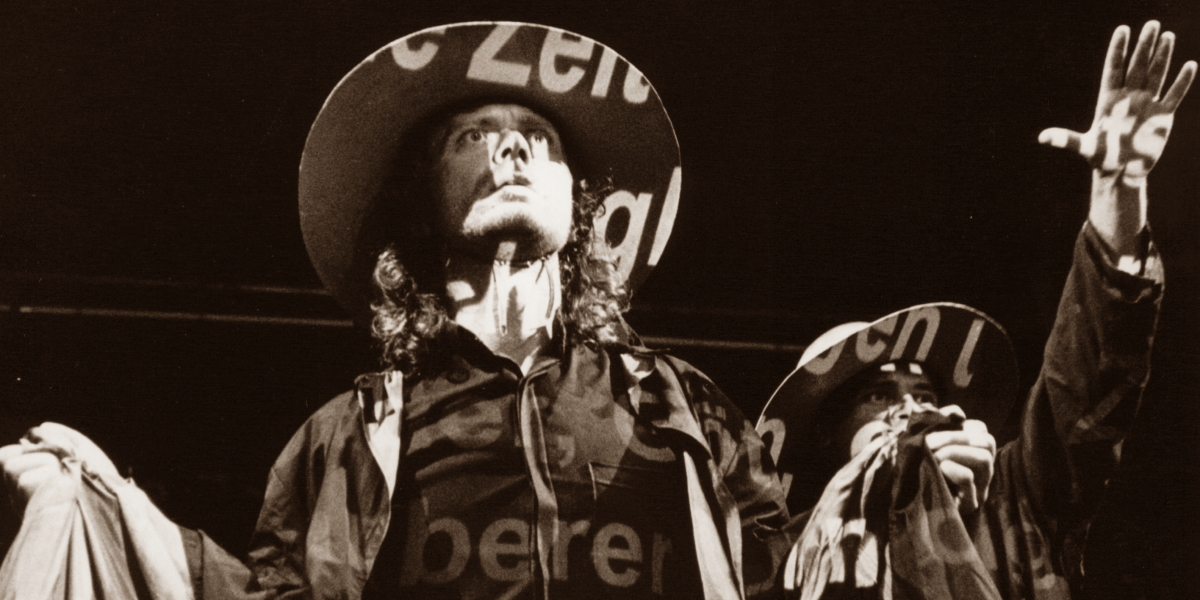MANDALA / MAJOR PERFORMANCES

THREETWOONE 2
Text, stage design, directing: Andrzej Sadowski
Cooperation: Katarzyna Deszcz
Part 1 - The Bench
Cast:
Marek Lelek, Zbigniew Kozłowski, Jacek Milczanowski, Jacek Wojciechowski
(Chasids),
Paweł Muzyka, Andrew Nixon, Andrzej Sadowski
(Intruders)
Part 2 - 22/7:
2/1 - This gloomy adventure repeat's itself every morning
2/2 - Resume
2/3 - Septus
Cast:
Teresa Pawłowicz Stokowska, Marek Lelek, Jacek Milczanowski, Andrzej Sadowski,
Jerzy Domski oraz Paweł Górecki, Jan Marian Wiśniewski(I version)
Zbigniew Kozłowski, Marek Lelek, Jacek Milczanowski, Jacek Wojciechowski,
Andrew Nixon, Paweł Muzyka oraz Andrzej Sadowski (II version)
Part 3 - To be continued...
the multimedia event, improvised to the end of’97 with the Mandala Theatre Company
and ADAM RZEPECKI & others...
Video: Adam Rzepecki
Technician:: Krzysztof Stokowski
Premiere: June'96, ARTEFACT, Erfurt, Germany
Presented in: PL + Germany + Macedonia + Croatia + Scotland + Ukraine + Switzerland
The Bench - The idea behind this performance is anti-street theatre, where the main performers are in constant conflict with a disruptive element, realised through the two remaining performers. The content of the performance is based on the stories of Hasidic jews by Martin Buber and Jiri Langer. Presented by the means of an everyday snapshot of life of Polish jews before the last war, the action takes place in the sense of four friends meeting on a bench, just to talk and comment on life. The conflict is realised through two actors (musicians), who are not part of this closed group, wanting to show that they have something better to offer.
This Glum Adventure is based on texts drawn from the Old Testament and examines the idea of the Apocalypse. Four Riders of the Apocalypse meet in a „hothouse”. As they play out a continuous ritual game of death, hatred and love, each one of them takes on the role of persecutor and victim in an often grotesque atmosphere.
In This glum adventure (22), the four Riders are joined by the presence of the Director, his interaction and interjections helping and hindering them throughout. Including the Director breaks and assumed convention, the characters reactions to this giving an unusual insight into the relationship between the physical figures and a higher authority. By imposing human frailties and limitations on mythical incarnations, we reflect and amplify our own imperfections.
Resume is a short, solo performance of the Director based on the subject taken from the first part.
Septus is based on the seven deadly sins. Septus (7) takes a step back to look at different conventions in theatre. In presenting different styles and then dissecting them, it is possible to show different views on these types of theatre. It is not just about „ sins’ in life „, but also on the stage. By using simple ( but not necessarily straightforward ) situations as examples, these ideas are clearly defined and not clouded by complications.
22/7 is highly physical and uses sound, live music, voice and light to explore the eternal fight between right and wrong, Carnival and Lent.
